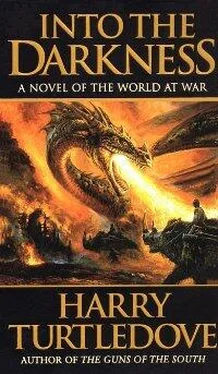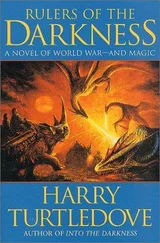He worked his way north, getting his shoes soggy and his knees dirty.
One of the reasons he enjoyed hunting mushrooms—aside from the pleasure of eating them later—was that he never knew ahead of time what he’d find. He tossed a few meadow mushrooms into his sack, just to make sure he didn’t come home empty-handed. They were good enough, but no better than good enough.
Chanterelles were better than good enough. He picked some egg-yellow ones because of their fine flavor, and some vermilion ones because his father enjoyed them, even if he himself found them acrid. Then, in some open woods he found a clump of orange Kaunian Imperial mushrooms. He studied them with care before plucking them from the ground; they were related to death caps and destroyers, both deadly poisonous. Only after he made sure they were safe did they go into the sack. They would be delicious.
And he felt like cheering when he stumbled upon an indigo milky mushroom. It wasn’t one of his favorites as far as flavor went, but his mother always clapped her hands when he came home with one because the exotic color made any dish in which she used it more interesting.
Then he came to a stand of trees with oyster mushrooms and ear mushrooms growing on their trunks, especially on the southern sides where sunlight did not reach them. The oyster mushrooms were particularly fine: fresh and grayish white, not old and tough and yellow. He went from tree to tree picking all he could; some grew higher than he could reach, even by jumping. He wondered what Sidroc would bring home—probably a mix altogether different from his.
He was so intent on harvesting those mushrooms, he didn’t notice anyone else was picking from the same stand of trees till they came round from opposite sides of the same big oak and almost bumped into each other. Nearly dropping his sack of mushrooms, Ealstan jumped back in surprise.
So did the other gatherer, a Kaunian girl not far from his own age.
They both laughed shakily. “You startled me,” they both said at the same time, with identical pointing forefingers. That made them laugh again.
“There are plenty for both of us,” Ealstan said, and the girl nodded. She might have been a year or so older than he was. Doing his best not to be too obvious about it, he eyed her figure, which her Kaunian-style tight tunic and trousers revealed in more detail than the long, loose tunics Forthwegian women wore. The knees of those trousers were dirty; she’d come out for the same reason he had, all right.
“Aye, there are.” She nodded again. She was looking at his dirty knees, too. Then, suddenly, she pointed to the sack he carried. “What have you got in there? Maybe we can trade a little, so we each have more different kinds.”
Kaunians in Forthweg were no less fond of mushrooms than any other Forthwegians. “All right,” Ealstan said. He grinned at her and dug out some of the orange mushrooms he’d found. “What will you give me for those Kaunian Imperials here? They ought to suit you.”
She studied him before answering, her blue eyes hooded. Kaunians, he knew, got touchy if you said what they thought was the wrong thing, or even the right thing in the wrong tone of voice. He must have passed the test, for she nodded and showed him some dull brown mushrooms from her sack. “I found these horns of plenty under dead leaves, if you’d like some of them.”
“All right,” he said again, and they made the trade. He went on, “You must have had sharp eyes to spot them. Sometimes you can walk through a big patch and never even know it, because they’re the same color as the leaves.”
“That’s true. I’ve done it.” The Kaunian amended her words with the precision of her people: “I’ve done it a couple of times and then seen them, I mean. Who knows how many times I’ve done it without even noticing?”
After that, they started talking about mushrooms and, almost coincidentally, about themselves. He found her name was Vanai, and that she lived in Oyngestun; she’d come east to hunt mushrooms, while he’d gone west from Gromheort. “How are things there?” he asked. “Are the redheads any better than they are in the city?”
“I doubt it,” Vanai answered bleakly. She added a word in Kaunian, a word Ealstan knew: “Barbarians.” Kaunians sometimes applied that word to Forthwegians. Hearing it slapped on the Algarvians made Ealstan chuckle and clap his hands together. Vanai looked sharply at him. “How much Kaunian do you speak?” she asked in that language.
“What I have learned in school,” he said, also in Kaunian. It was the first time he’d ever been glad he’d paid attention to his lessons. Only a couple of hours before, he’d laughed at himself for imagining he might meet a pretty girl while out picking mushrooms. Now he’d gone and done it, even if she was a Kaunian.
“You speak well,” she said, falling back into Forthwegian. “Not quickly, as you would your birthspeech, but well.”
Ealstan appreciated the praise all the more because she measured it so carefully. “Thank you,” he said. Then he remembered the Algarvian soldier taking obscene liberties with the Kaunian woman in the rubble-clearing gang back in Gromheort. It suddenly occurred to him, almost with the force of getting spellstruck, that being a pretty girl could carry disadvantages. He picked his words with care, too: “I hope they haven’t… insulted you.”
Vanai needed only a moment to understand what he meant. “Nothing too bad,” she said. “Shouts, jeers, leers—nothing I haven’t known from Forthwegians.” She turned red; with her fair skin, the blush was easy to see. “I don’t mean you. You’ve been perfectly polite.”
“Kaunians are people, too,” Ealstan said, repeating a phrase his father was fond of using. Ealstan sometimes wondered if that was why his father used it. Kaunians had dwelt in Forthweg since the days of their ancient Empire, even if Forthwegians greatly outnumbered them these days. His own distant ancestors had known nothing of stone keeps and theaters and aqueducts when they entered this country. He wondered if one of the reasons they despised Kaunians was that, somewhere down deep, Kaunians made them wonder if they were people themselves.
“Well, of course,” Vanai said. But it wasn’t of course, and they both knew it. A lot of Forthwegians didn’t think of Kaunians as people, and a lot of Kaunians returned the favor. Vanai changed the subject: “Your brother, you said, is a captive? That must be hard for your family. Is he well?”
“He says he is well,” Ealstan replied. “The Algarvians only let their captives write once a month, so we’ve not heard much. But he is alive, powers above be praised.” He didn’t know what he would have done had he learned Leofsig was dead.
He was about to add something more when, from not far away, a man called out in Kaunian: “Where are you, Vanai? Look! I’ve found a—” Whatever he’d found, it wasn’t a word Ealstan knew. Ealstan wondered if he’d found trouble himself. Was that Vanai’s father? Her brother? Maybe even her husband? He didn’t think she was old enough to wed, but he might have been wrong, disastrously wrong.
Then Vanai answered, “Here I am, my grandfather,” and Ealstan’s worry eased: a grandfather seemed unlikely to be dangerous. Nor did the man who came up a minute later look dangerous. He carried a fat puff-ball in his left hand; puffball, no doubt, was the Kaunian word Ealstan hadn’t understood. In Kaunian, Vanai said, “My grandfather, this is Ealstan of Jekabpils”—the classical name for Gromheort. “We have traded mushrooms.” She shifted to Forthwegian: “Ealstan, here is my grandfather, Brivibas.”
Brivibas looked at Ealstan as if he were a stinkhorn or a poisonous leopard mushroom. “I hope he has not troubled you,” he said to Vanai in Kaunian. He was, Ealstan saw at a glance, one of those Kaunians who automatically thought the worst of Forthwegians.
Читать дальше












